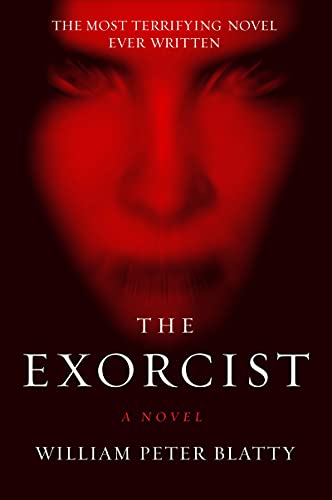The Exorcist
A Novel
William Peter Blatty
BOOK REVIEW

The Exorcist by William Peter Blatty isn't merely a book; it's an exploration into the darkest recesses of the human experience, a masterclass in horror that challenges our understanding of faith, evil, and the very nature of existence. 📚 The narrative captivates and horrifies in equal measure, making it no surprise that it remains one of the most significant novels in the horror genre even decades after its initial release.
At the heart of The Exorcist lies Regan MacNeil, an innocent girl possessed by a malevolent entity. The chilling episodes of her terrifying transformation shatter the facade of normalcy, forcing us to confront our deepest fears. Blatty expertly weaves a tale that grips the reader, intertwining moments of stark terror with profound, existential questions. What happens when evil invades our lives, not in abstract forms but manifested through the eyes of a child? This question strikes a powerful chord, compelling readers to delve deeper into the emotional and spiritual implications of such horror.
William Peter Blatty, drawing from his own studies in theology and his personal experiences, constructs this novel not just as a terrifying narrative but also as a philosophical treatise on good and evil. Born in a Christian family into a Lebanese immigrant household, Blatty's background is steeped in the conflict between faith and disbelief-a theme central to the book. It's no coincidence that the specter of doubt and the battle for Regan's soul mirrors Blatty's internal struggles, enhancing the authenticity with which he writes.
Critics and readers alike have found their reactions strikingly varied. Some hail The Exorcist as a profound exploration of faith and morality masked as horror, while others critique it for leaning too heavily into sensationalism. A review from The New York Times once remarked, "It is a gripping, compelling literary experience," while dissenters found it "overly melodramatic," raising questions about authenticity in horror. This polarization illustrates how the themes of demonic possession can evoke not just terror but profound introspection on our beliefs and values.
The historical context surrounding The Exorcist adds yet another layer of intrigue. Written during the turbulent 1970s-an era marked by political upheaval, a questioning of authority, and a growing disillusionment with traditional norms-the novel can be read as a reflection of a society in crisis. Amidst the backdrop of Watergate, the Vietnam War, and a burgeoning counterculture, Blatty's work forces us to reckon with the demons within our society just as much as the literal demons within Regan. Returning to this novel today, one can't help but reflect on how its exploration of evil resonates with contemporary fears.
As you read, you might find yourself at the precipice of terror, unable to look away from Regan's harrowing journey. Blatty's vivid descriptions pull you into the visceral horror of the exorcism itself. We are subjected to the grotesque and the grotesque becomes strangely beautiful in its raw, unfiltered horror. The author doesn't simply aim to terrify-he wants to provoke thought. You're not merely observing evil; you're being forced to confront what it means to embrace faith when all seems lost.
Readers have voiced their responses with fervor. For some, the gut-wrenching descriptions transcend mere fear, sparking deep discussions about spirituality and belief. Others, however, recoil at the gruesome imagery and question the emotional toll it exacts. For instance, many young readers have struggled with the realities of demonic possession, while seasoned fans of horror recognize the novel's adeptness in crafting a sinister atmosphere. As a result, The Exorcist stimulates dialogue that is as expansive and varied as its readership.
Perhaps the most terrifying aspect of this novel is its lingering nature. After turning the last page, you find yourself ensnared by a chilling unease that refuses to dissipate. Blatty's narrative doesn't just end; it plagues your thoughts with questions that beg for resolution-how does one reconcile the existence of evil with a belief in a higher power? Can faith triumph over despair?
In an era where societal anxieties manifest in various forms, The Exorcist remains profoundly relevant. It's not merely a horror story; it's a commentary on a world grappling with its morality. As Blatty invites you to wrestle with these questions, you'll soon realize that the horrors depicted are not confined to the pages of a book-they are reflections of the battles we face in our daily lives. So, if you dare to step into this haunting narrative, know this: you will emerge changed, forced to confront your own beliefs as you navigate the delicate dance between good and evil. 🌌
📖 The Exorcist: A Novel
✍ by William Peter Blatty
🧾 403 pages
2011
#exorcist #novel #william #peter #blatty #WilliamPeterBlatty